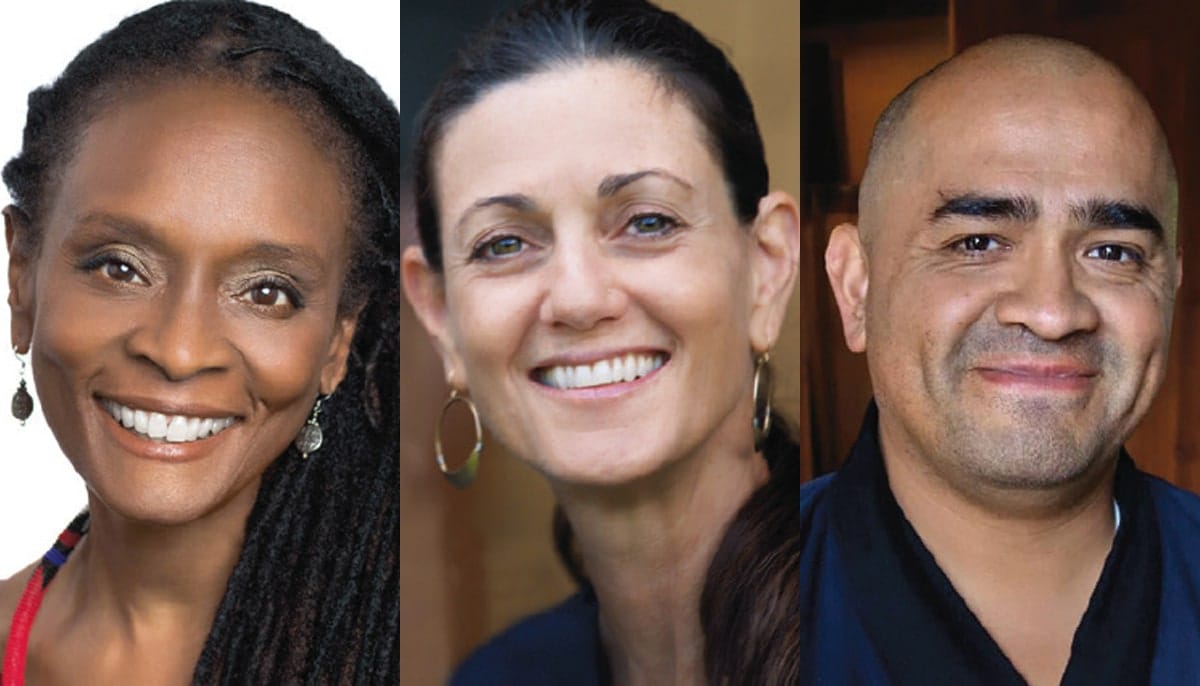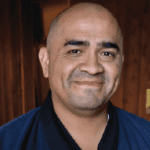Question: Are there types of work that are incompatible with Buddhist practice? If so, what if you don’t have the freedom to leave a job on philosophical grounds?
Konda Mason: The Buddha stressed that the work we choose, how we sustain ourselves, is central to living an ethical life. Within the eightfold path is right livelihood, the teaching that one’s work should be compatible with sound moral principles and should cause no harm. In a less complicated world 2,600 years ago, the Buddha listed five livelihoods he considered unethical: trading in weapons, human beings, meat, intoxicants, and poison.
Fair enough.
Today, however, we live in a complex industrialized society driven by a hungry market economy; many livelihoods now fall short of the principle of nonharming. In our deeply interconnected world, is it even possible to make a living in a way that is compatible with right livelihood?
What’s most important is what’s in your heart.
Let’s consider some hypothetical, yet typical, slices of American life. Imagine a town whose main industry is a toxic chemical company that employs a large percentage of the town’s population. Mrs. Brown, who is aware of the harm the company causes to the health of the environment, people, and other living beings, is employed there, as her family has been for generations. Mrs. Brown is seen as having a good job. If the plant were to shut down, she would have no other options.
On the other side of town, in a community that has been historically undercapitalized, undereducated, underemployed, and under-resourced, lives Mr. White. He faces structural systems of oppression built into our society, which belie our American belief in rugged individualism and the notion that people who just work hard enough can pull themselves up by their own bootstraps. Failing in his many attempts to land a living-wage job that would provide for him and his family, Mr. White turns to the underground economy, where harm to others is an unfortunate by-product.
Then there is Mr. Green, who upon graduating from the same Ivy League college as his parents lands a lucrative job on Wall Street, selling and trading stocks that directly contribute to the destruction of people and the planet. Focusing on himself and his family, Mr. Green simply desires to make as much money as he can in order to live a good life and afford his children the same privileges he had. Meanwhile, the externalities of polluted air and water and displaced communities in faraway places are normalized as inevitable outcomes of modern progress and economic growth.
Using the metric of nonharming, who would you say has right livelihood? We are all, in an interconnected way, complicit to harming in varying degrees.
So, what to do?
What’s most important is what’s in your heart. There are many ways to live a life of nonharming. As my teacher, colleague, and friend Larry Yang says:
May I be as loving and compassionate as I can be. If I cannot be loving in this moment, may I be kind. If I cannot be kind, may I be nonjudgmental. If I cannot be nonjudgmental, may I not cause harm. And if I cannot not cause harm, may I cause the least amount of harm possible.
I believe we can all live within the scope of these principles.
Elizabeth Mattis Namgyel: For laypeople, the Buddha’s teachings on right livelihood mean avoiding work that is injurious to others, such as slaughtering animals, dishonest business dealings, or anything that might harm the environment.
Precepts, such as a commitment to right livelihood, provide a scaffolding to hold us up in our intention to practice nonviolence. As a living practice, vows are propositions that keep us asking questions about our relationship to the world around us. Whether or not we are benefiting or harming others is not a simple matter of a job description, or of black-and-white principles we may have about what is “good” and what is “bad.” Buddhist ethics are much more nuanced than that.
The Mahayana scriptures teach that bodhisattvas can appear as butchers or prostitutes, vocations generally condemned as violating right livelihood. Kindness can show up anywhere, even where we least expect it. There is no intrinsically “pure” vocation. We are part of a matrix of contingent relationships. Just by virtue of being alive we can’t avoid causing harm, at least indirectly.
The workplace can be a rich environment to practice dharma.
The Buddha called this state of affairs “all-pervasive suffering.” If you are a policymaker, for instance, it is likely the decisions you make will benefit some people and harm others, even if your motivation is altruistic. The Mahayana scriptures also say a bodhisattva’s greatest fear is to rest in a state of perfect peace, divorced from the suffering of beings. The bodhisattva is committed to engaging challenging situations, to “infiltrating from within.”
The workplace—like any other place—can be a rich environment to practice dharma. To influence a situation may just mean extending a bit of warmth and kindness, or finding nonreactive ways to creatively finesse the flow around us. People need more tenderness and sanity in their lives, and they need examples. If we can provide this, people will notice. In turn, they may discover that they are capable of doing the same. To extend kindness, warmth, and insight is the true vocation of a practitioner.
Jose Shinzan Palma: While any job that involves breaking the precepts, causing harm, or contributing to greed, hatred, or ignorance is incompatible with the Buddhist path, in many cases it is not so obvious or clear that precepts are being violated. We live in a world that is so interconnected that we can never completely isolate ourselves from causing harm or leaving a footprint.
The eightfold path calls us to find a right or appropriate livelihood, by which I think the Buddha had a threefold intention. First, he was aware of, and wanted to reduce, the suffering experienced by sentient beings as a result of unwholesome labor. Second, he understood that such actions would create unhelpful karmic results. And finally, he realized agitation would arise in one’s own heart–mind as a result of knowingly engaging in such labor. This residual disturbing energy in the mind as a result of engaging in nonvirtuous actions makes it more difficult for a meditator to concentrate.
Are there ways we can mindfully contribute something helpful?
Many people, as they deepen in their practice, begin to recognize some level of mental agitation as a result of their work activities. Often, though, they are not in a position to leave their jobs. There may be any number of mitigating factors to someone’s particular situation, but in general we must all work to survive. Assuming our intentions are not to cause harm, are there ways we can mindfully contribute something helpful—to create a more equitable, kind, and balanced world, even in the midst of non-ideal circumstances? It is worth examining how we might incorporate those aspirations into our daily tasks.
There is a famous Zen quote: “Where the water is too pure, there are no fish.” This phrase points to the error in thinking there is any ideal situation with respect to one’s job—or anything else in life. Our practice can help us realize the impossibility of creating lasting perfect conditions. All we can do is our best to contribute to harmony, peace, happiness, and well-being for ourselves and society.
How can we best align our work lives with our Buddhist values in a way that serves both ourselves and others? Through practice, we can access the wisdom to discern the answer to this question. We are all continually challenged by life circumstances to wake up to the ways in which we cause harm through our greed, hatred, and ignorance. And in waking up to the challenges of our lives, in looking deeply at our actions and intentions, we can in turn help to wake up the entire world.




